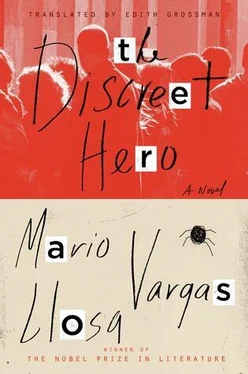“But Father, we’re doing it for your own good.” Miguel still tried to persuade him. “So that nothing happens to you. Listen to us, we’re your sons.”
“Not another word on this subject,” ordered Felícito. “If something happens to me, you’ll be in charge of Narihualá Transport and can do whatever you want. Even hire bodyguards, if you feel like it. There’s no way I will.”
He saw his sons lower their heads and reluctantly begin to eat. Both of them had always been fairly dutiful, even during adolescence, when kids tend to rebel against parental authority. He didn’t recall their giving him many headaches, except for a few stunts, nothing very important. Like Miguel’s accident, when he killed a donkey on the highway to Catacaos — he was learning to drive and the burro walked in front of the car. They were still pretty obedient, even though they were grown men. Even when he ordered Miguel to join the army as a volunteer for a year to toughen him up, he obeyed without a word. And truth be told, they did their work well. He’d never been especially hard on them, but neither was he one of those indulgent fathers who spoil their children and turn them into bums or faggots. He’d tried to guide them so they’d know how to face adversity and be able to move the company forward when he couldn’t anymore. He had them finish school, learn to be mechanics, get licensed to drive buses and trucks. And both had worked every job at Narihualá Transport: guard, sweeper, bookkeeper’s assistant, driver’s helper, inspector, driver, etcetera, etcetera. He could die at peace, they were both ready to replace him. And they got along with each other, they were very close, thank goodness.
“Me, I’m not afraid of those sons of bitches,” he suddenly exclaimed, hitting the table. His sons stopped eating. “The worst they can do is kill me. But I’m not afraid of dying. I’ve lived fifty-five years and that’s plenty. I’m at peace knowing Narihualá Transport will be in good hands when I go to join my father.”
He noticed that the boys tried to smile but were upset and nervous.
“We don’t want you to die yet, Father,” murmured Miguel.
“If those guys hurt you, we’ll make them pay,” declared Tiburcio.
“I don’t think they’ll dare to kill me,” said Felícito, trying to reassure them. “They’re thieves and extortionists, that’s all. You need more balls to kill than you do to send letters with drawings of spiders.”
“At least buy a revolver and carry it with you, Father,” Tiburcio persisted. “So you can defend yourself just in case.”
“I’ll think about it, we’ll see,” Felícito conceded. “Now I want you to promise me that when I leave this world and Narihualá Transport is in your hands, you won’t give in to extortion by these motherfuckers.”
He saw his sons exchange a look that was somewhere between surprise and alarm.
“Swear to God, right now,” he demanded. “I want to rest easy on that score in case something happens to me.”
They both agreed and crossed themselves as they murmured, “We swear to God, Father.”
They spent the rest of lunch talking about other things. Felícito began to think about an old idea. Since they’d left home to live on their own, he knew very little about what Tiburcio and Miguel did when they weren’t working. They didn’t live together. The older one boarded in a house in the Miraflores district, a white neighborhood, of course, and Tiburcio rented an apartment with a friend in Castilla, near the new stadium. Did they have girlfriends, lovers? Were they carousers, gamblers? Did they get drunk with their friends on Saturday night? Did they go to bars and taverns or patronize whorehouses? What did they do in their spare time? On Sundays when they stopped by to have lunch in the house on Calle Arequipa, they didn’t talk much about their private lives, and he and Gertrudis didn’t ask questions. Maybe he should talk with them, find out a little more about the boys’ personal lives.
The worst thing during this period were all the interviews, the result of the notice in El Tiempo , at several local radio stations, with reporters from the newspapers Correo and La República , and with the correspondent in Piura for RPP Noticias. The journalists’ questions made him very tense: His palms got sweaty and chills ran down his spine. His answers were punctuated by long pauses; he searched for words, denying vehemently that he was a civic hero or an example for anybody. Not at all, what an idea, he was simply following the philosophy of his father, who’d left him this piece of advice as an inheritance: “Son, never let anybody walk all over you.” They’d smile; some looked at him with an intimidating expression. He didn’t care. Screwing up his courage, he went on. He was a workingman, that’s all. He’d been born poor, very poor, near Chulucanas, in Yapatera, and everything he had he’d earned by working. He paid his taxes, obeyed the law. Why should he allow a few crooks to take what he had, sending him threats without even showing their faces? If nobody gave in to extortion, extortionists would disappear.
He didn’t like to receive awards either; he broke into a cold sweat when he had to give speeches. Of course, deep down, he was proud and thought how happy his father, the sharecropper Aliño Yanaqué, would have been at the Exemplary Citizen medal pinned on his chest at a Rotary Club lunch in the Piuran Center, attended by the regional president and the mayor and the bishop of Piura. But when he had to approach the microphone to express his gratitude, he became tongue-tied and lost his voice. The same thing happened when the Enrique López Albújar Civic-Cultural-Athletic Society declared him Piuran of the Year.
This was when a letter came to his house on Calle Arequipa from the Club Grau, signed by the president, the distinguished chemist-pharmacist Dr. Garabito León Seminario. It stated that the board of directors had unanimously accepted his application for membership in the institution. Felícito couldn’t believe his eyes. He’d sent in his application two or three years ago, and since they never responded, he thought they’d voted against him because he wasn’t white, which is what they believed they were, those gentlemen who went to the Club Grau to play tennis, Ping-Pong, Sapo, the card game cacho , swim in the pool, and dance on Saturday nights to the best orchestras in Piura. He’d found the courage to apply after he saw Cecilia Barraza, the Peruvian artist he admired most, sing at a party in the Club Grau. He’d gone with Mabel and sat at the table of Colorado Vignolo, who was a member. If he’d been asked to name the happiest day of his life, Felícito Yanaqué would have chosen that night.
Cecilia Barraza had been his secret love even before he saw her in photographs or in person. He fell in love with her because of her voice. He didn’t tell anyone about it; it was private. He’d been in La Reina, a now-defunct restaurant on the corner of the Eguiguren Seawalk and Avenida Sánchez Cerro, where on the first Saturday of each month the board of directors of the Association of Interprovincial Drivers of Piura, of which he was a member, would meet for lunch. They were toasting with carob syrup cocktails when suddenly he heard someone on the radio singing one of his favorite waltzes, “Soul, Heart, and Life,” with more charm, emotion, and candor than he’d ever heard before. No Peruvian singer he knew — not even Jesús Vásquez, or the Morochucos, or Lucha Reyes — interpreted this beautiful waltz with as much feeling, charm, and mischievous wit as this singer he was hearing for the first time. She imbued each word and syllable with so much truth and harmony, so much delicacy and tenderness, that it made you want to dance, even to cry. He asked her name and was told: Cecilia Barraza. As he listened to that girl’s voice, he seemed to understand completely, and for the first time, many of the words in Peruvian waltzes that had seemed mysterious and incomprehensible before—“arpeggios,” “skylights,” “ecstasy,” “cadence,” “yearning,” “celestial”—became clear:
Читать дальше

![Гарри Гаррисон - Bill, the Galactic Hero [= The Starsloggers]](/books/87536/garri-garrison-bill-the-galactic-hero-the-star-thumb.webp)










